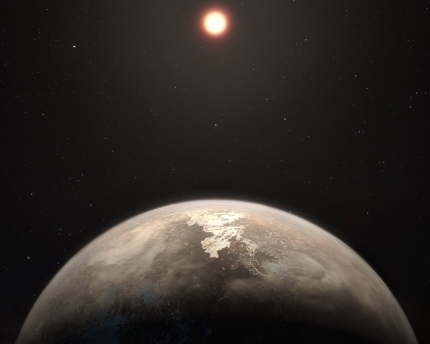Planet has "temperate" climate

Artist's concept of the planet 11 light years away.
Image: ESO/M. Kornmesser
But scientists say a planet just 11 light-years away from our solar system has a temperate climate. And because the planet orbits an inactive red dwarf star, this “may increase the likelihood that this planet could potentially sustain life,” according to the European Southern Observatory.
Designated Ross 128 b, it is the second-closest temperate planet to be detected after Proxima b. While Proxima b is theoretically within its star's habitable zone -- meaning it is warm enough on the planet to have liquid water -- scientists do not think Proxima b is habitable. The problem is that some stars bathe orbiting planets in ultraviolet and X-ray radiation, and Proxima b's star is volatile.
But the newly discovered planet receives only 1.38 times more irradiation than Earth, according to the observatory. It orbits the red dwarf star known as Ross 128, in the constellation Virgo. The star was named for the late astronomer Frank Elmore Ross (1874-1960), who discovered it. It is cooler than our sun, and the European Southern Observatory describes it as a quiet star. The star is also moving toward our solar system and is expected to become our nearest stellar neighbor in 79,000 years.
The planet is low mass, with a surface temperature that varies from 60 degrees below zero Celsius and 20 degrees Celsius -- in Fahrenheit, that's 76 degrees below zero to 68 degrees. Ross 128 b orbits the star once every 10 days. But there is one catch, according to the observatory: “Uncertainty remains as to whether the planet lies inside, outside or on the cusp of the habitable zone, where liquid water may exist on a planet’s surface.”
Related:
Proxima b may not be in habitable zone
Small probe could orbit Proxima b
Follow StudyHall.Rocks on Twitter.
If you would like to comment, like us on Facebook and tell us what you think.

